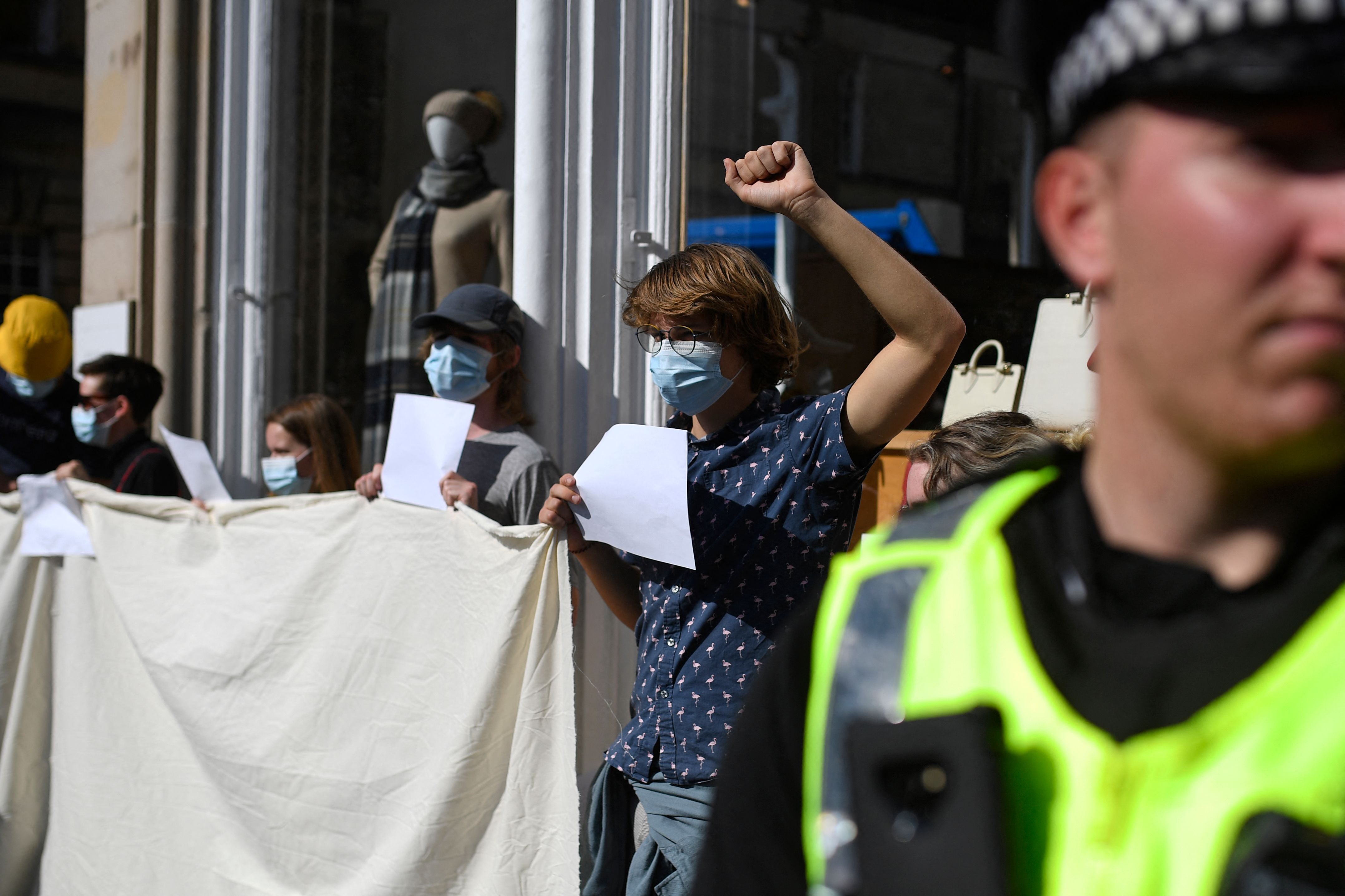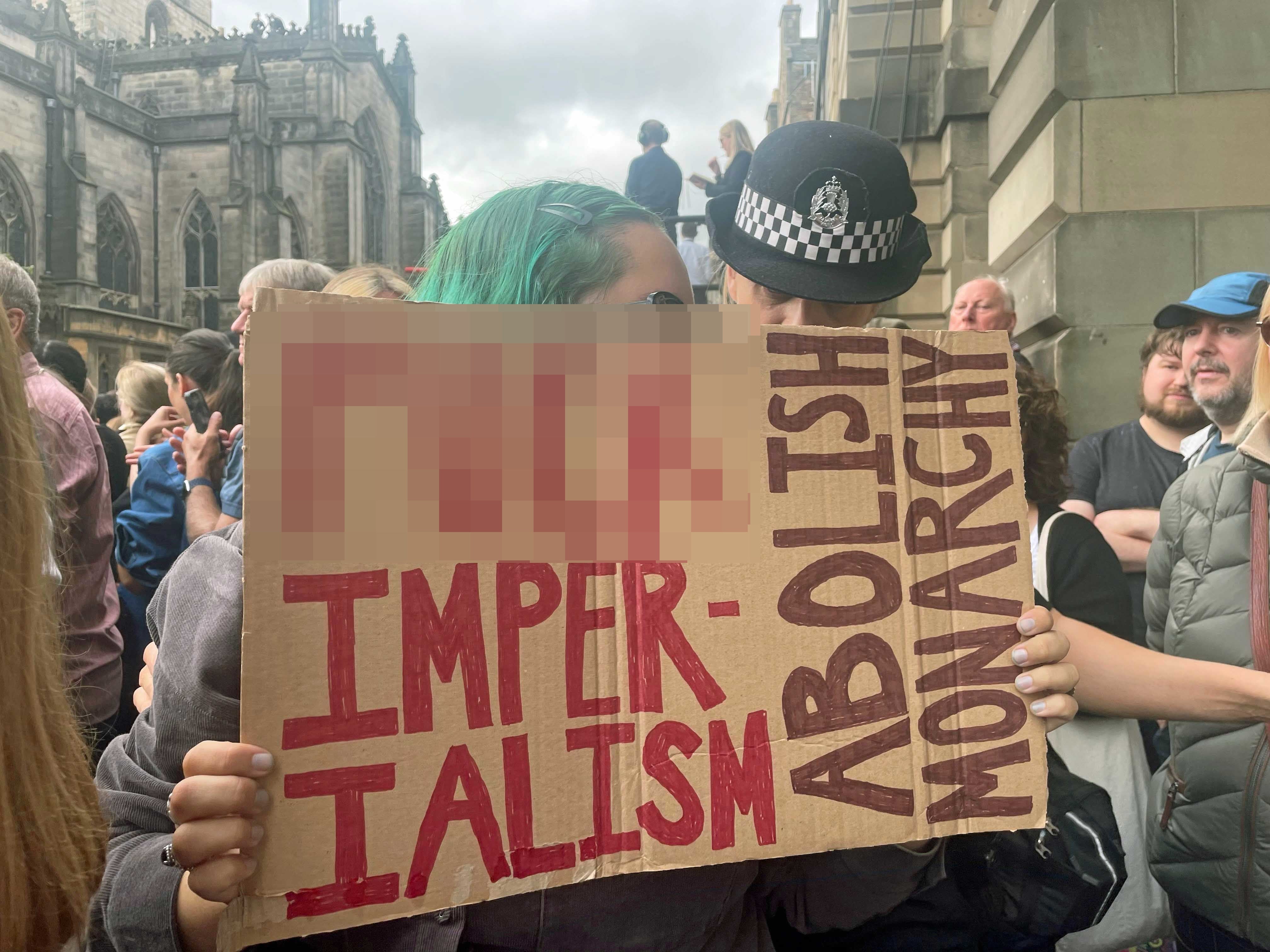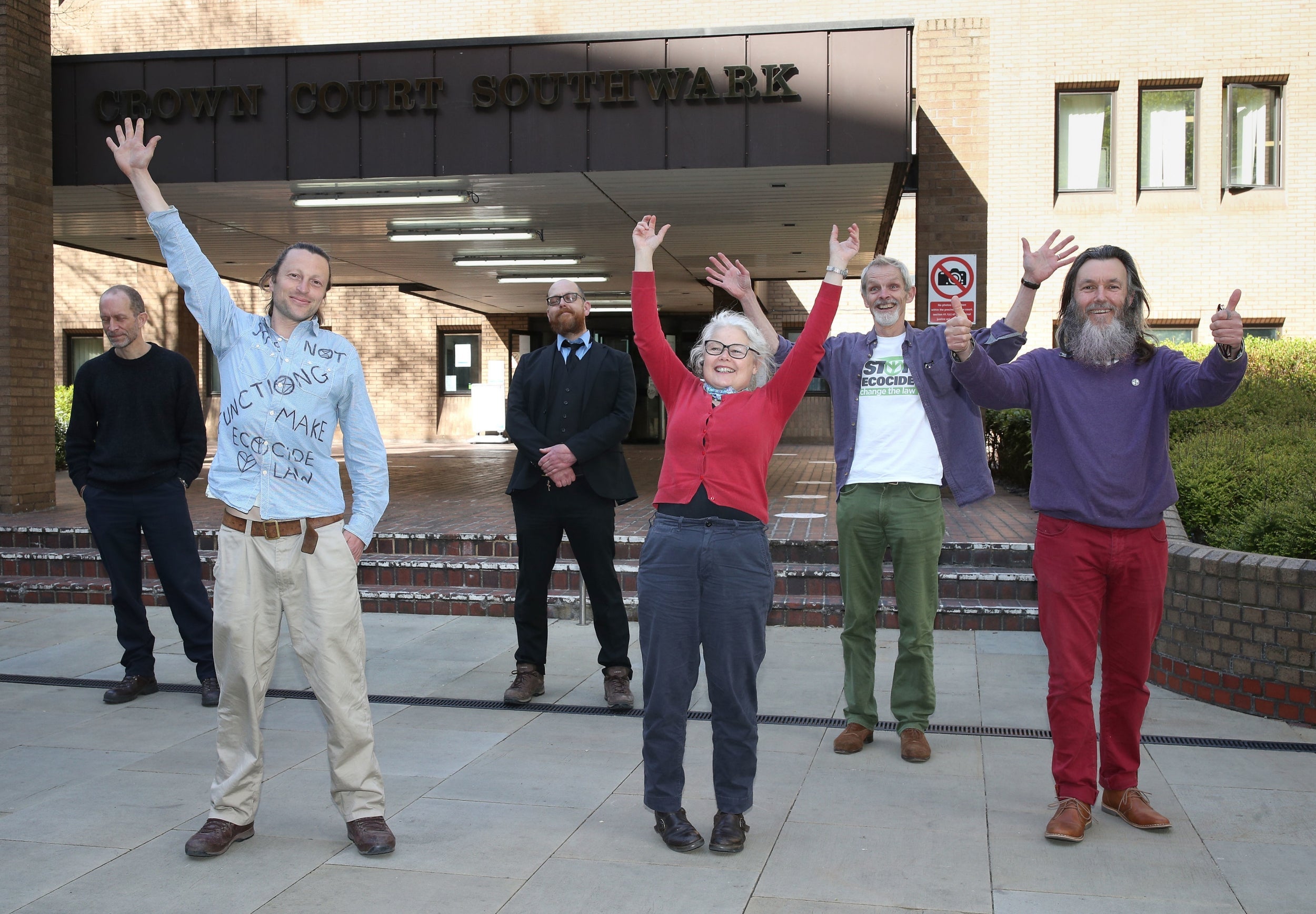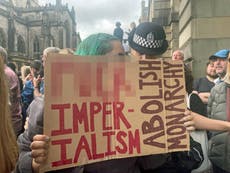Breaching the peace: What are your rights to protest against the monarchy?
Police have been using different laws against republican protesters in England and Scotland
Your support helps us to tell the story
From reproductive rights to climate change to Big Tech, The Independent is on the ground when the story is developing. Whether it's investigating the financials of Elon Musk's pro-Trump PAC or producing our latest documentary, 'The A Word', which shines a light on the American women fighting for reproductive rights, we know how important it is to parse out the facts from the messaging.
At such a critical moment in US history, we need reporters on the ground. Your donation allows us to keep sending journalists to speak to both sides of the story.
The Independent is trusted by Americans across the entire political spectrum. And unlike many other quality news outlets, we choose not to lock Americans out of our reporting and analysis with paywalls. We believe quality journalism should be available to everyone, paid for by those who can afford it.
Your support makes all the difference.Several anti-monarchy protesters have been arrested or spoken to by police in the UK, sparking questions about the laws around freedom of speech.
Different laws, including “breach of the peace” in Scotland and the Public Order Act in England have been used in arrests linked to commemorations of the Queen’s death and the proclamation of the King.
A man who heckled Prince Andrew as he followed the Queen’s cortege in Edinburgh on Monday is among those arrested, along with a woman holding up an “abolish monarchy” sign at a proclamation ceremony the previous day.
At least four people have so far been charged in relation to anti-monarchy protests in Scotland, while in England one man has been arrested and other demonstrators have been questioned or moved on by police.
The response has provoked alarm from human rights groups, and saw Conservative MP David Davis write to the chief constable of Police Scotland urging officers to “respect the right to free speech”.
“I speak as a strong monarchist, but nevertheless I hope that members of the public will remain free to share their opinions and protest in regard to issues about which they feel strongly,” he added.
The National Police Chiefs’ Council (NPCC), which covers forces across the UK, said guidance had been issued aiming to ensure “a consistency of approach” as events relating to the Queen’s death take place in different locations.
A spokesperson added: “The ability to protest is a fundamental part of democracy and it is a long-established right in this country. We know some people want to protest on a range of issues during this time of national mourning and officers must balance these rights against those who wish to grieve and reflect.”
The NPCC said each protest had to be assessed on its unique circumstances and that “all groups or causes are treated impartially”.
What are the rights to protest?
Everyone has a right to protest in the UK, which is protected by the Human Rights Act.
The 1998 law, which enshrines the European Convention on Human Rights (ECHR), was set to be repealed and replaced by the government but work on a new “Bill of Rights” – a pet project of former justice secretary Dominic Raab – has been shelved by Liz Truss.
The key parts that protect protesters are articles 10 and 11; the rights to freedom of expression and freedom of assembly and association.
Article 10 states that “everyone has the right to freedom of expression”, covering the right to hold opinions and impart ideas and information “without interference by public authority”.

The ECHR makes clear that the right is not unqualified, and can be lawfully constrained for reasons including national security, public safety, health protection and preventing crime and disorder.
Article 11 states that “everyone has the right to freedom of peaceful assembly”, adding: “No restrictions shall be placed on the exercise of these rights other than such as are prescribed by law and necessary in a democratic society.”
It says the article does not “prevent the imposition of lawful restrictions … by members of the police or the administration of the state”.
The law means that protest can be limited by police and the government, but only in ways that are aligned with the ECHR.
Numerous legal challenges arising from specific incidents and government policies have resulted in a significant amount of British case law showing that competing rights and “legitimate aims” must be balanced when limiting a person’s human rights.
How can the right to protest be limited?
There are several pieces of legislation across the UK that can be applied to protest or have been drawn up directly to manage demonstrations.
Some are wide-ranging, such as the Public Order Act 1986, while others, such as measures in the new Police, Crime, Courts and Sentencing Act, were designed with specific types of protest in mind.
Many of the principles at work pre-date individual pieces of legislation and were built on centuries-old common law and conventions.
The front page of the Public Order Act, for example, states that it aims to “abolish the common law offences of riot, rout, unlawful assembly and affray” and create statutory offences in their stead.

What powers can be used against protesters?
The most commonly-used police powers relating to protest arise from the Public Order Act 1986, which covers the whole of the UK.
Police can arrest people for “threatening or abusive words or behaviour, or disorderly behaviour, or displaying any writing, sign or other visible representation which is threatening or abusive within the hearing or sight of a person likely to be caused harassment, alarm or distress”.
If prosecuted, offenders can be fined up to £1,000.
Critics have said the law’s wording is too vague and allows subjective judgements by police and prosecutors that infringe on freedom of speech.
A man was arrested in Oxford after calling out “Who elected him?” at a proclamation ceremony for the new King, but was later de-arrested by police.
Several anti-monarchy protesters were arrested in Scotland under a different power – breach of the peace.
The common law offence is not widely enforced in England and Wales, and legal difficulties around its interpretation caused the Scottish government to create a new offence in 2010.

Section 38 of the Criminal Justice and Licensing (Scotland) Act, which has been used to charge republican protesters originally arrested for breach of the peace in Edinburgh, criminalises threatening or abusive behaviour “likely to cause a reasonable person to suffer fear or alarm”.
Those convicted can be sentenced to up to five years’ imprisonment, or given a fine.
People prosecuted with the separate common law “breach of the peace” offence in Scotland face a maximum penalty of a 60-day prison sentence or a fine of up to £2,500.
Another law commonly used against protesters is obstructing the highway, contrary to section 137 of the Highways Act 1980, which makes it a crime to block a road without “lawful authority or excuse”.
A landmark legal challenge brought by arms trade protesters saw the Supreme Court declare that protest can be a “lawful excuse” to block roads, sparking cases against climate campaigners, Extinction Rebellion, and HS2 protesters to be dropped or overturned.
A June 2021 ruling added: “There should be a certain degree of tolerance to disruption to ordinary life, including disruption of traffic, caused by the exercise of the right to freedom of expression or freedom of peaceful assembly.
“There must be an assessment of the facts in each individual case to determine whether the interference with article 10 or article 11 rights was ‘necessary in a democratic society’.”
A spectrum of other crimes has been used in response to illegal conduct by protesters, such as criminal damage and stirring up racial hatred.

What limits can be applied to protests?
The Public Order Act allows the police to impose conditions, such as requiring specific routes, timings or logistical arrangements for protests that may result in serious disorder, disruption or damage to property.
People who break those conditions can be arrested and fined.
Parts of the Police, Crime, Courts and Sentencing Act, which came into force in June, lowered the threshold for conditions to be imposed and for breaches to be enforced.
It allowed conditions to be imposed on demonstrations if the noise generated caused “serious disruption” or has a “significant impact” on anyone nearby.
The power to impose restrictions was extended from moving processions to static assemblies and protests by a lone person.
The act also created a new offence of “intentionally or recklessly causing public nuisance”, including “serious annoyance”, punishable by up to 10 years in prison.
Previously, police conditions had to be broken “knowingly” for an offence to be committed, but the word was removed so people can be charged if they “ought to know a condition has been imposed”.
The maximum sentence for failing to comply with conditions was increased from three months to a year.
The government said the measures were necessary to combat “highly disruptive and sometimes incredibly dangerous” protests, naming Extinction Rebellion and other environmental groups, but has since brought forward even more restrictive proposals in a separate Public Order Bill.
Proposals in that batch of laws would create “serious disruption prevention orders” to restrict individual protesters – even if they have not committed a crime – from locking themselves to buildings and infrastructure, making it a criminal offence, and allow the suspicionless stop and search of protesters for items that could be used for that purpose.
The new bill would create offences of interfering with key national infrastructure or obstructing major transport works, punishable by imprisonment.
It is being scrutinised in the House of Commons, after being voted through by Conservative and Democratic Unionist Party MPs despite opposition from all other parties.
Parliament’s Joint Committee on Human Rights accused the government of trying to create “new powers in areas where the police already have access to powers and offences which are perfectly adequate”.
A June 2021 report added: “Peaceful protests are by their nature liable to cause serious annoyance and inconvenience and criminalising such behaviour may dissuade individuals from participating. Offences are already available under existing laws.”
Subscribe to Independent Premium to bookmark this article
Want to bookmark your favourite articles and stories to read or reference later? Start your Independent Premium subscription today.




Join our commenting forum
Join thought-provoking conversations, follow other Independent readers and see their replies
Comments